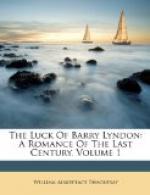’Died at Castle-Lyndon, in the kingdom of Ireland, the Right Honourable Sir Charles Lyndon, Knight of the Bath, member of Parliament for Lyndon in Devonshire, and many years His Majesty’s representative at various European Courts. He hath left behind him a name which is endeared to all his friends for his manifold virtues and talents, a reputation justly acquired in the service of His Majesty, and an inconsolable widow to deplore his loss. Her Ladyship, the bereaved Countess of Lyndon, was at the Bath when the horrid intelligence reached her of her husband’s demise, and hastened to Ireland immediately in order to pay her last sad duties to his beloved remains.’
That very night I ordered my chariot and posted to Ostend, whence I freighted a vessel to Dover, and travelling rapidly into the West, reached Bristol; from which port I embarked for Waterford, and found myself, after an absence of eleven years, in my native country.
CHAPTER XIV
I return to Ireland, and exhibit my splendour and generosity in that kingdom
How were times changed with me now! I had left my country a poor penniless boy—a private soldier in a miserable marching regiment. I returned an accomplished man, with property to the amount of five thousand guineas in my possession, with a splendid wardrobe and jewel-case worth two thousand more; having mingled in all the scenes of life a not undistinguished actor in them; having shared in war and in love; having by my own genius and energy won my way from poverty and obscurity to competence and splendour. As I looked out from my chariot windows as it rolled along over the bleak bare roads, by the miserable cabins of the peasantry, who came out in their rags to stare as the splendid equipage passed, and huzza’d for his Lordship’s honour as they saw the magnificent stranger in the superb gilded vehicle, my huge body-servant Fritz lolling behind with curling moustaches and long queue, his green livery barred with silver lace, I could not help thinking of myself with considerable complacency, and thanking my stars that had endowed me with so many good qualities. But for my own merits I should have been a raw Irish squireen such as those I saw swaggering about the wretched towns through which my chariot passed on its road to Dublin. I might have married Nora Brady (and though, thank Heaven, I did not, I have never thought of that girl but with kindness, and even remember the bitterness of losing her more clearly at this moment than any other incident of my life); I might have been the father of ten children by this time, or a farmer on my own account, or an agent to a squire, or a gauger, or an attorney; and here I was one of the most famous gentlemen of Europe! I bade my fellow get a bag of copper money and throw it among the crowd as we changed horses; and I warrant me there was as much shouting set up in praise of my honour as if my Lord Townshend, the Lord Lieutenant himself, had been passing.




